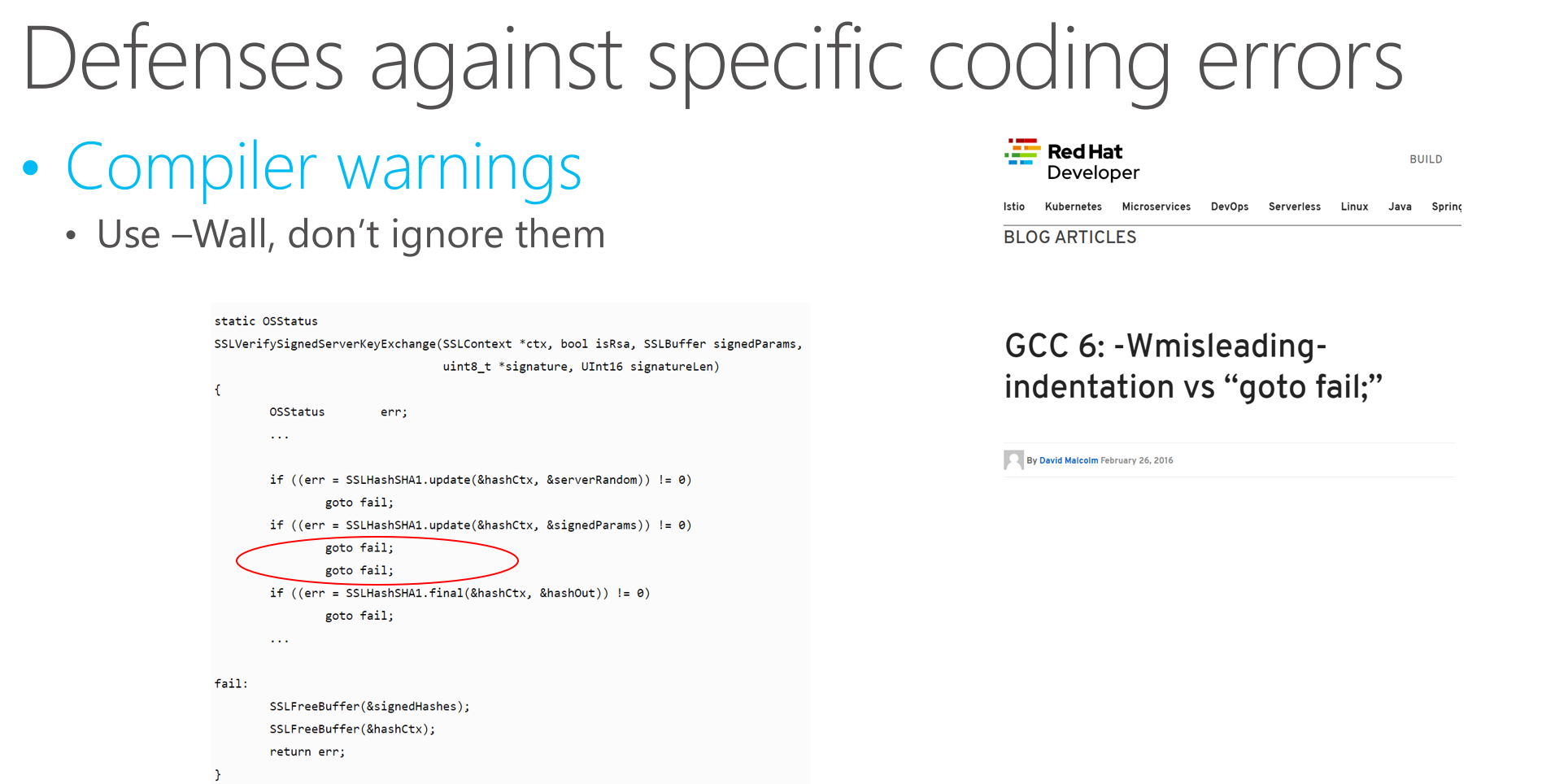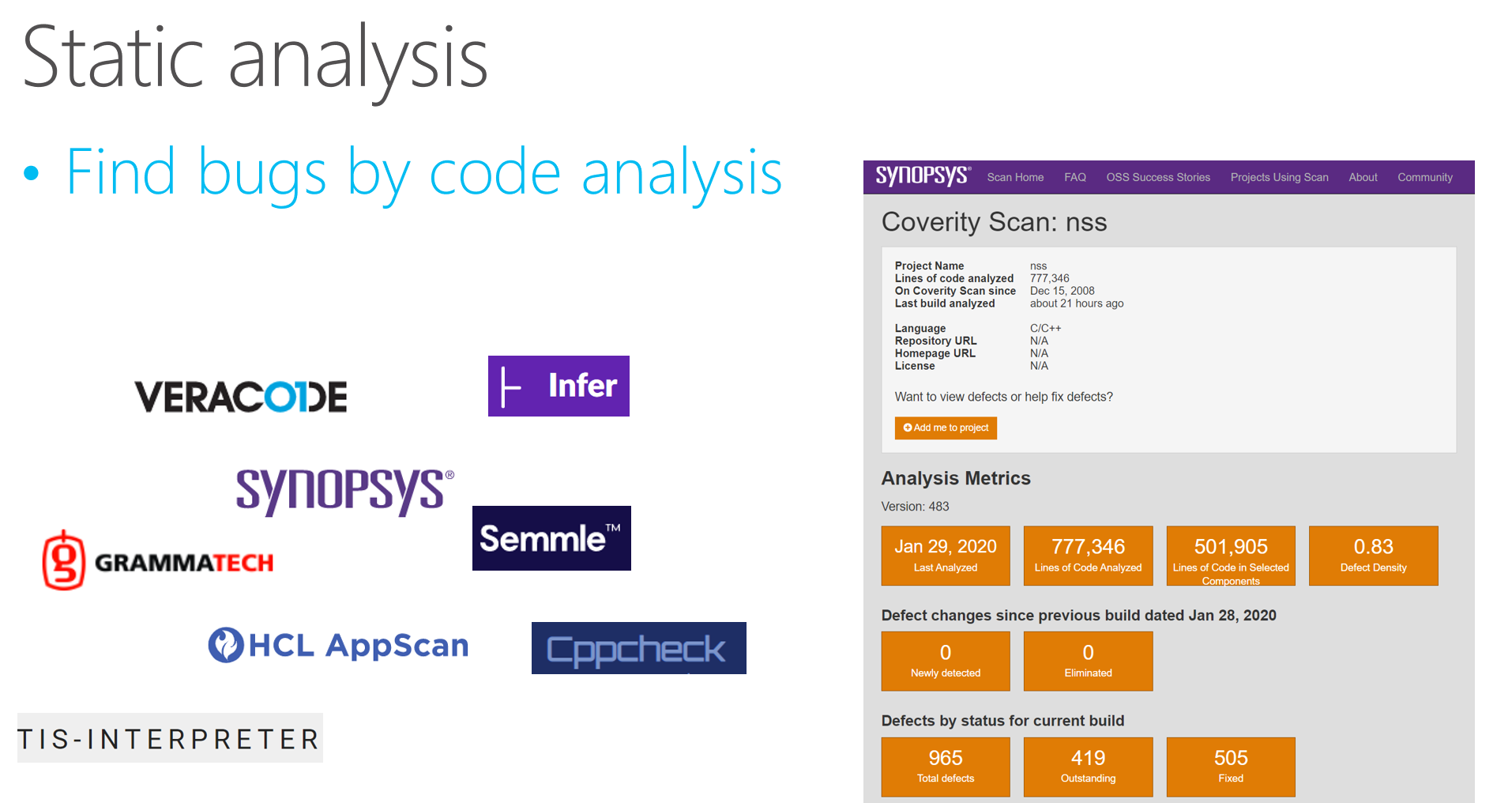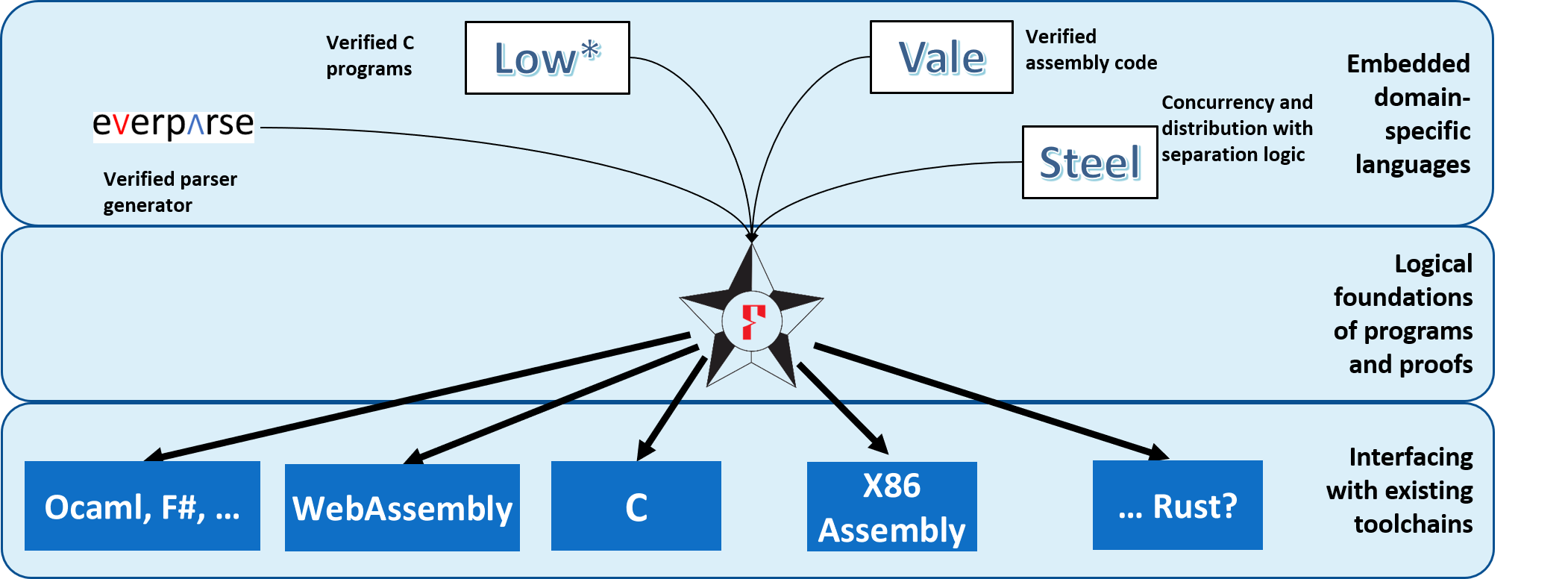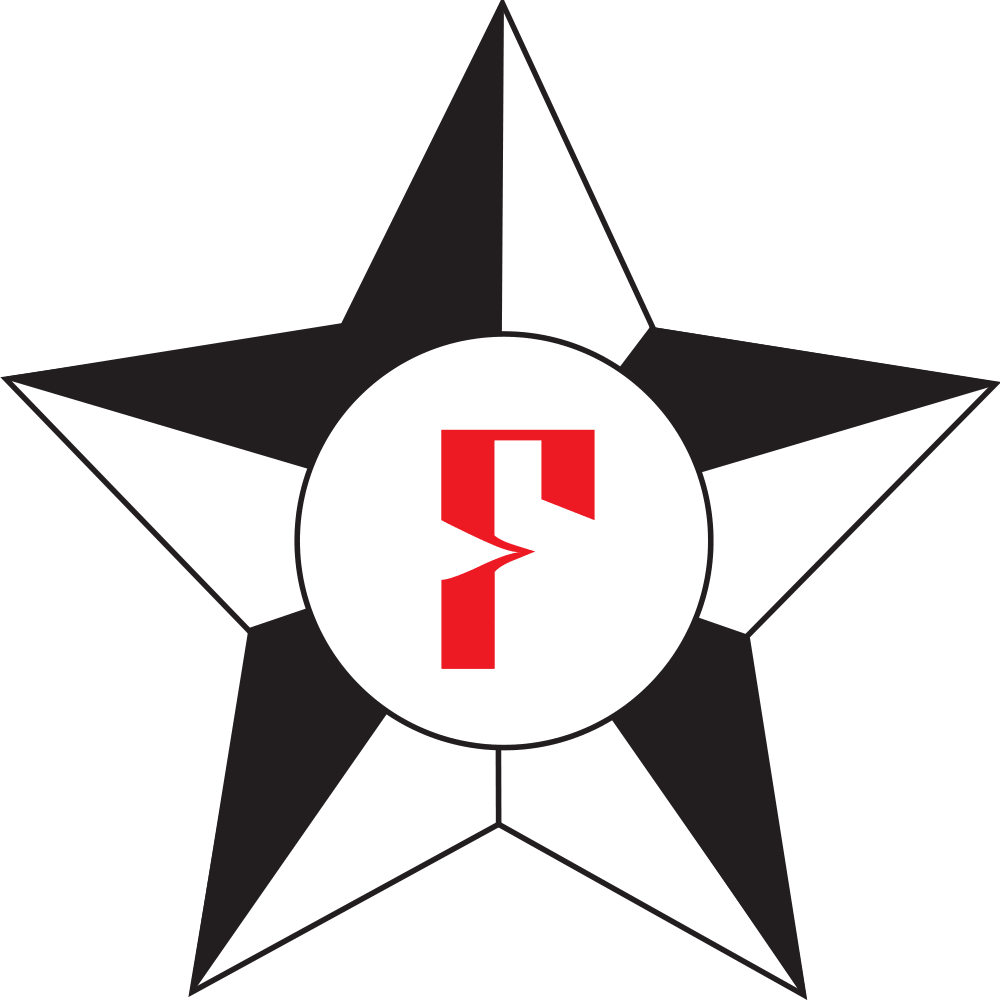Proof-oriented Programming in F*
Embedding Proof-oriented Programming Languages in F*
Towards High-assurance Software
Through Code Analysis (1)

Through Code Analysis (2)

Program Proofs at Scale
-
Mathematical specifications of correctness and security
-
Machine-checked proof that the code does not deviate from the spec
-
Foundational: Against a formal machine model
-
Integrated: Single theorem covering all the code
-
Many successes in the past 10-15 years
Project Everest
https://project-everest.github.io
-
Building and deploying system components with proofs of correctness and security
-
Focusing on secure communication software: TLS, QUIC, Signal, etc.
-
But, also secure sub-systems, like measured boot, high-integrity key-value stores etc.
-
-
Developed using the F* programming language
-
Building and maintaining formal proofs at scale
-
Multiple times a day, our continuous integration system verifies and builds more than 600,000 lines of F* code and proof
-
Proof automation “in the small”
-
10^6 small proof obligations discharged by Z3 at each build
-
Domain-specific languages with carefully designed full automation for specific kinds of proofs
-
-
Modular abstractions to compose proven components
-
Reusable Verified Artifacts and Tools
Program Proofs in F* for Billions of Unsuspecting Users

Contributors (1)
Contributors (2)

Still expensive to develop proofs
-
State of the art: 1 line of code : N lines of manual proof, where
- N=20, manual, interactive proof of trickiest code
- N=5, partially automated proofs of imperative code
- N=0.2, code generated by metaprograms
- N=0, very specific domains where proofs in specific DSLs can be fully automated
-
Verifying a large piece of existing code, “after the fact”, is still too difficult
-
Often writing a LOT more proof than code
- Pays to work in a framework optimized for proving and proof automation
- Pays to structure a program with its proof in mind
Proof-oriented programming
-
Programs and their proofs, co-developed
-
Good synergies:
-
Proofs can be simpler, because the program's structure is designed to facilitate it
-
Programming can be simpler, since proofs guide program construction, e.g., unreachable cases can be ignored
-
Programs can be more “daring”, since invariants help justify optimizations too risky to attempt otherwise
-
F*: A Framework for Proof-oriented Programming
-
Functional programming language with effects
- like OCaml, F#, Haskell, …
- F* extracted to OCaml or F# by default
- Subset of F* compiled to efficient C code and to Wasm
-
Semi-automated program verifier using automated theorem proving
- like Dafny, FramaC, Why3, …
-
With an expressive core language based on dependent type theory
- like Coq, Lean, Agda, Idris, … Nuprl
-
A metaprogramming and tactic framework for interactive proof and user-defined automation
- like Coq, Isabelle, Lean, PVS, etc.
-
And many foundational program logics for embedded DSLs
- Many variants of Hoare logic for sequential programs
- Concurrent separation logic, for concurrent and distributed programs
- Relational Hoare logic, for program equivalence and security proofs
Proof-oriented Programming Languages Embedded in F*

Outline of this course
-
Lecture 1: Introducing F*
- Basic functional programming with dependent types
- Deep embeddings:
- Warm up: Simply typed lambda calculus
- Vale: A proof-oriented assembly language
-
Lecture 2: Shallow embeddings of effectful languages
- Stateful programming with an ML-style heap
- Indexed computations and Dijkstra monads
- Security-oriented programming: An embedded language with information flow control
Outline of this course
-
Lecture 3: Layering effectful DSLs
- Low*: Programming and proving with a C-like memory model
- EverParse: A parser generator layered on Low*
-
Lecture 4: Concurrent programming and separation logic
- Warm up: A total semantics for concurrency
- Deriving a concurrent separation logic for partial correctness
- Steel: A DSL for proof-oriented concurrent and distributed programming
Installing F*
-
F* online
- http://fstar-lang.org/run.php
- Okay for small experiments, but a lot of this course will involve following along as I demo larger pieces of code
-
For Windows and Linux:
- Recent release binaries: https://github.com/FStarLang/FStar/releases/
-
For Mac:
- Build from sources: https://github.com/FStarLang/FStar/blob/master/INSTALL.md
- Must use Z3-4.8.5
- If you have an M1/ARM, you may need to rebuild Z3 from sources
-
Help? Community: https://aka.ms/JoinEverestSlack
F* Interactive Mode in Emacs
Resources to learn more about F*
-
Online book / tutorial in your browser
-
Many talks, summer/winter schools, linked online
- Verification of pure and stateful programs: VTSA2019
- Verified low-level programming and crypto: OPLSS 2019 http://fstar-lang.org/oplss2019/index.html
- Metaprogrammig: ECI 2019
- …
-
Many research papers, will link to background reading as we go
- Start with this one https://fstar-lang.org/papers/mumon/
-
Community: https://aka.ms/JoinEverestSlack
Today: Dependently typed functional programming in F*
-
The functional core of F*
-
Several style of proof illustrated on simple functional programs
-
Reading: https://fstar-lang.org/#tutorial
Basic types
-
The empty type: It has no values
type empty = -
The singleton: It has exactly 1 value
type unit = () -
Boolean: It has exactly 2 values
type bool = true | false -
…
Inductive type definitions
- Simple inductive data types
type list a =
| Nil : list a
| Cons : hd:a -> tl:list a -> list a- But, actually, (mutually) inductive type families
type rbtree a : nat -> color -> Type =
| Leaf : rbtree a 1 Black
| R : left:rbtree a h Black -> value:a -> right:rbtree a h Black -> rbtree a h Red
| B : left:rbtree a h cl -> value:a -> right:rbtree a h cr -> rbtree a (h+1) BlackRecursive functions
-
Recursive functions
let rec factorial (n:int) : int = if n = 0 then 1 else n * (factorial (n - 1)) -
Inductive datatypes (immutable) and pattern matching
let rec map (f: a -> b) (x:list a) : list b = match x with | [] -> [] | hd :: tl -> f hd :: map f tl -
Lambdas (unnamed, first-class functions)
map (fun x -> x + 42) [1;2;3] ~> [43;44;45]
Refinement types
type nat = x:int{x>=0}-
Informal mental model: A type describes a set of values
let empty = x:int { false } //one type for the empty set let zero = x:int{ x = 0 } //the type containing one element `0` let pos = x:int { x > 0 } //the positive numbers let neg = x:int { x < 0 } //the negative numbers let even = x:int { x % 2 = 0 } //the even numbers let odd = x:int { x % 2 = 1 } //the odd numbers let prime = x:nat { forall n. x % n = 0 ==> n = 1 || n = x } //prime numbers -
Refinements introduced by type annotations (code unchanged)
let rec factorial (n:nat) : nat = if n = 0 then 1 else n * (factorial (n - 1)) -
Logical obligations discharged by SMT (simplified)
n >= 0, n <> 0 |= n - 1 >= 0 n >= 0, n <> 0, factorial (n - 1) >= 0 |= n * (factorial (n - 1)) >= 0 -
Refinements eliminated by subtyping:
nat<:intlet i : int = factorial 42 let f : x:nat{x>0} -> int = factorial
Dependent types
-
Dependent function types (), here together with refinements:
val incr : x:int -> y:int{x < y} let incr x = x + 1 -
Can express pre- and post- conditions of pure functions
val incr : x:int -> y:int{y = x + 1} -
Exercise: Can you find other types for
incr?
Total, recursive functions
-
Toteffect (default) = no side-effects, terminates on all inputslet rec factorial (n:nat) : nat = (if n = 0 then 1 else n * (factorial (n - 1))) -
F* refuses to accept this type for factorial. Why?
val factorial : int -> int
let rec factorial n = (if n = 0 then 1 else n * (factorial (n - 1)))
^^^^^
Subtyping check failed; expected type (x:int{x << n}); got type int factorial (-1) loops! (int type in F* is unbounded)
Semantic termination checking
-
based on well-founded ordering on expressions (
<<)- naturals related by
<(negative integers unrelated) - inductives related by subterm ordering
x << D xf x << D f
- lexicographic tuples
%[a;b]%[a; b] << [a'; b']ifa << a', ora = a'andb << b'- Derived from the subterm ordering using accessibility predicates
- naturals related by
-
arbitrary total expression as decreases metric
val ackermann: m:nat -> n:nat -> Tot nat (decreases %[m;n]) let rec ackermann (m n:nat) : Tot nat (decreases %[m;n]) = if m=0 then n + 1 else if n = 0 then ackermann (m - 1) 1 else ackermann (m - 1) (ackermann m (n - 1)) -
default metric is lex ordering of all (non-function) args
val ackermann: m:nat -> n:nat -> Tot nat
Lemmas
let rec length (xs:list a) : nat =
match xs with
| [] -> 0
| _::tl -> 1 + length tl
let rec append (xs ys : list a) : list a =
match xs with
| [] -> ys
| x :: xs' -> x :: append xs' ys- Prove that the length of append is the sum of the lengths of its arguments
let rec append_length (xs ys : list a) : Lemma (length (append xs ys) = length xs + length ys) = match xs with | [] -> () | x :: xs' -> append_length xs' ys- Proof by induction on xs
- Base case,
xs=[]is easy:append [] ys = ys /\ length [] = 0 - Step: Use IH by calling function recursively on smaller arguments
- Sugar:
Lemma p = u:unit { p }`
- Base case,
- Proof by induction on xs
More Lemmas
let snoc l h = l @ [h]
let rec reverse (l:list a) : list a =
match l with
| [] -> []
| hd::tl -> snoc (reverse tl) hdlet rec rev_snoc (l:list a) (h:a)
: Lemma (reverse (snoc l h) == h::reverse l)
= match l with
| [] -> ()
| hd::tl -> rev_snoc tl hlet rec rev_involutive (l:list a)
: Lemma (reverse (reverse l) == l)
= match l with
| [] -> ()
| hd::tl -> rev_involutive tl; rev_snoc (reverse tl) hdProof of a program: QUICKSORT
- Work through the online tutorial and you'll reach eventually a proof of correctness of quicksort.
let rec quicksort (f:total_order a) (l:list a)
: Tot (m:list a{sorted f m /\ is_permutation l m})
(decreases (length l))
= match l with
| [] -> []
| pivot::tl ->
let hi, lo = partition (f pivot) tl in
let m = quicksort f lo @ pivot :: quicksort f hi in
permutation_app_lemma pivot tl (quicksort f lo) (quicksort f hi);
mDemo: Two Deeply Embedded Languages
-
Basics: factorial, lemmas, vectors
-
Warm up: Simply Typed Lambda Calculus
-
Vale: A Proof-oriented Assembly Language
Extra
Lemmas, squashed types, and proof irrelevance
-
Lemma pis sugar forTot (u:unit{p}) -
We write
squash pinstead ofu:unit{p}- So,
Lemma pis sugar forTot (squash p)
- So,
-
The type
squash pis a sub-singleton, i.e., it has at most one element().
(** All proofs of [squash p] are equal *)
val proof_irrelevance (p: Type) (x y: squash p) : Tot (squash (x == y))-
The type
propin F* is defined as all the subtypes ofunit.- i.e., For
p:propand proof ofp, i.e.,e:pis noninformative
- i.e., For
Equality
-
Two notions of equality
-
Definitional equality: if and only if .
-
Provable equality: and are provably equal if is inhabited, i.e., you can build a term of the following type
type equals (#a: Type) (x: a) : a -> Type = | Refl : equals x x- In F*, we write
x == yto meansquash (equals x y).
Extensionality: The Essence of F*
-
Clearly, if
xythenx == y. -
In intensional type theories, given
e : tandtt', then by conversione : t'. -
Equality reflection: In F*, like in other extensional type theories (e.g., Nuprl), if
e:tandt == t', thene : t'.-
i.e., types conversion is possible through the silent use of provable equalities
-
v: vec a (n + 0)is convertible withvec a n, since(n + 0) == n, althoughn + 0n.
-
-
However, this makes typechecking in F* undecidable
- Practically speaking, F* uses SMT to decide if/when a conversion is applicable
Functional Extensionality, Subtyping and Eta reduction
-
With equality reflection, it is possible to prove, when `e == e':
(fun (x:a) -> e) == (fun (x:a) -> e') -
But, subtyping adds another level of subtletly (we got this wrong a couple of times)
-
Due to refinement subtyping, we have
(x:t0 -> t0') <: (x:t1 -> t1')whent1 <: t0andt0' <: t1'.- E.g.,
(int -> nat) <: (nat -> int).
- E.g.,
-
But, this means that eta reductions do not preserve types
- E.g., for
f:int -> nat, reducingfun (x:nat) -> f xtofwidens its domain.
- E.g., for
-
Given some
f, g: int -> nat, provingequals (fun (x:nat) -> f x) (fun (x:nat) -> g x)does not implyequals f g(e.g., we may havef (-1) <> g (-1)). -
So, definitional equality in F* does not include eta reduction
